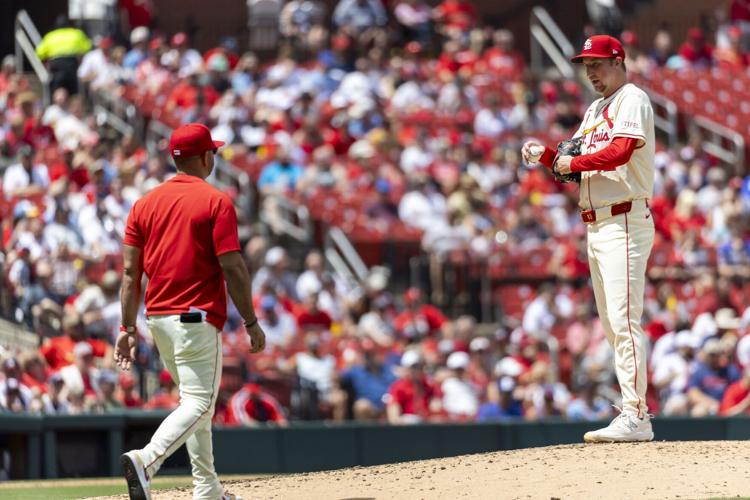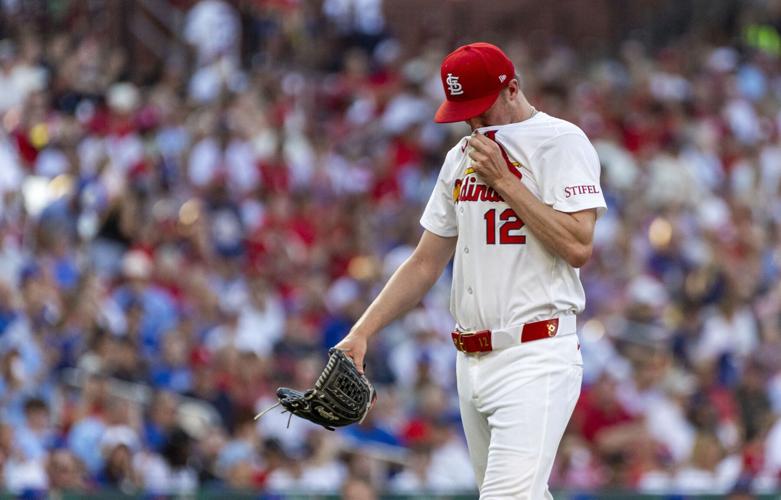Despite the ghastly ending for pitcher Erick Fedde, who the Cardinals designated for assignment on Wednesday, the trade wasn’t an error for the club or outgoing president of baseball operations John Mozeliak.
Fedde’s tenure crashed to a halt like an anvil dropped from the top of the Gateway Arch. He didn’t push the rotation to a next level, but that was never why the Cardinals acquired him.
As much as Cardinals followers will want to believe they’ve moved into a new era with a new head of baseball operations coming aboard at the end of the season in Chaim Bloom, the Cardinals likely aren’t yet past the point of getting utility out of guys like Fedde.
Their pipeline hasn’t progressed so much that they can rely on internal options to fill their needs. Players like Fedde fill in gaps to bridge to their homegrown options. They’ll likely still need a few of the Feddes of the baseball world in the immediate future.
People are also reading…

Cardinals manager Oliver Marmol, left, approaches the mound to remove starting pitcher Erick Fedde from the game against the Braves on Saturday, July 12, 2025, at Busch Stadium.
Whether you want to call him a placeholder, a stand-in or something else, Fedde bought them time. He helped them tread water for almost one year.
That was his larger purpose, helping the Cardinals rotation doggy paddle to this point.
Remember that at the time Fedde joined the club, Matthew Liberatore was pitching in relief and Andre Pallante had barely made his 10 starts after an early-season transition out of the bullpen that required a stint in the minors.
Fedde provided a serviceable, somewhat-experienced rotation option (he appeared in his 150th MLB game earlier this season) that allowed the Cardinals to maintain a deliberate and measured approach in developing their young starting pitching prospects — an area they’d fallen painfully short in recent years.
No amount of hoping, wishing, praying, foot stomping or pounding on the table you did would’ve changed the fact that the pitching prospects, aside from McGreevy, weren’t viable options for rotation to start this season.
Even Liberatore’s presence in the rotation came a bit out of nowhere at the end of spring training.
Forcing the matter with any one of the other minor-league starters at the start this season would have been reckless, and it could have set that pitcher back significantly.
Injuries definitely factored into the equation, eliminating options such as Zack Thompson and Drew Rom from every being in the conversation. That’s also the nature of pitching. An injury or two always wait around the corner.
So Fedde was necessary, especially since the Cardinals coffers were locked up pretty tight this winter. Lest we forget, the lone free-agent addition was Phil Maton.
In the final recap of Fedde’s Cardinals stint, he made 30 starts and posted a 4.69 ERA — slightly lower than Miles Mikolas’ ERA each of the past three seasons (5.07) — with a 5-15 record, 157 1/3 innings, a 1.39 WHIP, 6.2 strikeouts per 9 innings and 3.7 walks per 9 innings.
In fairness, the pitcher the Cardinals acquired prior to last summer’s trade deadline performed significantly better in the previous 21 starts with the Chicago White Sox in his return to MLB after a year in Korea.

Cardinals starting pitcher Erick Fedde leaves the mound after giving up three runs in the second inning against the Cubs on Wednesday, June 25, 2025, at Busch Stadium.
That Fedde posted a 7-4 record with a 3.11 ERA, 8.0 strikeouts per 9 and 2.5 walks per 9 while pitching for a team that sent a historic bar for futility.
Fedde’s recent performance made him the subject of widespread angst, including that of Cardinals skipper Oli Marmol. Coupled with the fact he blocked Michael McGreevy from the rotation, that combination irreparably colored Fedde’s entire stint with the club.
Over his final five starts, Fedde made it through just 17 2/3 innings, posted a 13.25 ERA, walked more batters (11) than he struck out (eight) and gave up eight home runs. He gave up six runs or more in three of those starts, and the Cardinals lost each of his final five starts.
Certainly, ending Fedde’s tenure two starts earlier might have made a lot of people feel a little better. However, the impact would not have been earth shifting.
As for the price the Cardinals paid for Fedde, they traded away from an area of redundancy when they sent to the Los Angeles Dodgers. His primary positions — shortstop, second base, center field — were areas where the Cardinals had multiple options either at the big leagues or knocking at the door.
Not to mention, Edman never appeared in a game for the Cardinals last season due to a wrist injury.
Edman’s outstanding postseason performance doesn’t erase the fact that in 117 regular season games with the Dodgers (entering Thursday), he’s batted .230 with a .284 on-base percentage and a .404 slugging percentage with 17 home runs and nine stolen bases.
Going by the metric wins above replacement (WAR) as calculated by , Cardinals center fielder Victor Scott II, shortstop Masyn Winn and all-star second baseman Brendan Donovan have each, individually, been more valuable this season than Edman.
The Cardinals did not lose.
The other part of the Fedde deal included the Cardinals shipping a teenage Panamanian pitcher who, respectfully, even the most devoted Cardinals follower couldn’t identify if he sat down next to them at the ballpark (right-hander Oliver Gonzalez) to the Dodgers.
Meanwhile, the Cardinals also added veteran outfielder and right-handed hitter Tommy Pham to their lineup until they decided to cut him loose and allow him the chance to catch on with a team in playoff contention.
The lingering feeling of unhappiness about the Fedde trade for Cardinals fans isn’t because they made an awful deal. They didn’t.
That feeling is a result of the awful last few weeks for Fedde, and it’s because the deal also reflects the predicament the organization created by failing to produce internal starting pitching options.














